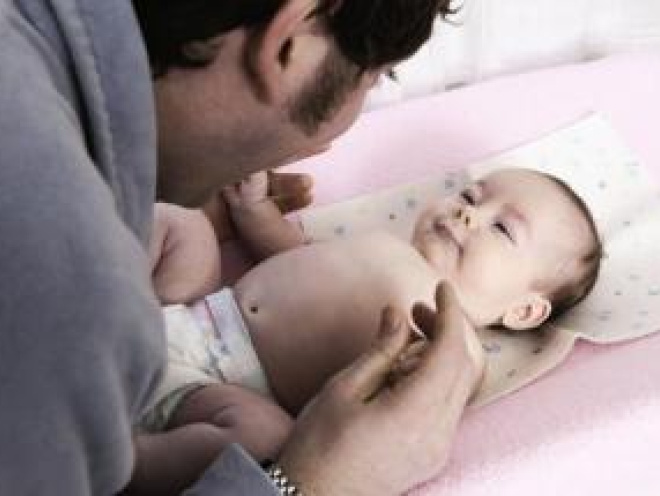The contents of your baby’s nappies change day by day at first. This can help to reassure you feeding is going well. Here’s our guide on what to expect.
Breastfed and formula fed babies
A baby that’s been formula fed may have poo that’s less soft and less frequent than a baby of the same age that has been breastfed. Babies that are breastfed have poo that’s more of a toothpaste consistency and browner in colour (NICE, 2015; NHS Choices, 2015).
"Some babies, regardless of how they are fed, get to the yellow poo stage sooner than others. It means your baby is feeding very effectively, and probably taking in more milk (NHS Choices, 2015)."
What’s a ‘heavy nappy’?
With disposable and reusable nappies it can sometimes be hard to tell if they are wet. Try this test so you have an idea of what to expect: pour two to four tablespoons of water into a dry nappy and pick it up. That’s roughly how heavy your baby’s nappy will be when wet, from day five onwards (NHS Choices, 2016a).
Some disposable nappy brands now have a wetness indicator strip on them, which changes colours when your baby has a wee. This can help reassure you they have had a wee if you aren’t sure.
If your baby is wearing a reusable nappy, you may need to open it to check whether it’s wet, depending on the design and style. Some reusable nappies have a liner inside, which you can check for wetness. Others may need the cloth of the nappy itself checking.
Is it OK if my baby doesn’t poo every day
Yes, but only after the first few weeks (NHS, 2016a). Your baby might not poo for a day or more in the first week or so. If this is the case, it may be a sign they need to feed more often or more effectively. Ask your midwife, health visitor or GP for advice if you are concerned (NHS Choices, 2015).
After the first week, babies continue to wee and poo several times a day for the first few weeks (NHS Choices, 2015). After that, some but not all babies poo less often.
Some babies that are breastfed may go for days or even a week without having a poo at all.
After the first few weeks, babies that are formula fed usually poo at least once a day (NHS, 2016a).
As a general guide, as long as your baby is growing well, their poo will be soft and regular. With no changes to what is usual for your baby, you don’t need to be worried (NHS Choices, 2016b).
If your baby’s poos change and become very hard, watery, smelly or have blood in them, talk to your GP or health visitor. These could be signs of constipation, diarrhoea or other conditions. Very pale poo could be a sign of liver disease (NHS Choices, 2015).
What is false menstruation?
Early on you may see a small amount of blood in your newborn baby girl’s nappy. This very light bleed is a mini period and is harmless. It’s caused by hormones passing from you to your baby before birth and soon stops (NHS Choices, 2015). If it continues talk to your midwife, health visitor or GP.
What should I do if I’m worried?
In the early days of your baby’s life, the contents of their nappy can change day by day. The above is a useful guide if you aren’t sure about their nappy contents or whether they are weeing or pooing frequently enough in the early days.
If you are concerned about your baby’s feeding, the content of their nappies or their health, talk to your midwife, health visitor or GP.
This page was last reviewed in October 2017.
Further information
Our support line offers practical and emotional support with feeding your baby and general enquiries for parents, members and volunteers: 0300 330 0700.
Make friends with other parents-to-be and new parents in your local area for support and friendship by seeing what NCT activities are happening nearby.
NHS Choices. (2015) How to change your baby’s nappy’. Available from: http://www.nhs.uk/Conditions/pregnancy-and-baby/pages/nappies.aspx [Accessed 1st October 2017].
NHS Choices. (2016a) Breastfeeding: Is my baby getting enough milk? Available from: http://www.nhs.uk/Conditions/pregnancy-and-baby/Pages/breastfeeding-is-baby-getting-enough-milk.aspx [Accessed 1st October 2017].
NHS Choices. (2016b) How to change your baby's nappy. Available from: https://www.nhs.uk/conditions/pregnancy-and-baby/nappies/ [Accessed 1st October 2017].
NICE. (2015) Clinical Knowledge Summaries. Constipation in children. Available from: https://cks.nice.org.uk/constipation-in-children#!diagnosissub [Accessed 1st October 2017].
UNICEF. (2010) Breastfeeding checklist for mothers - How can I tell that breastfeeding is going well? Available from: https://www.unicef.org.uk/babyfriendly/wp-content/uploads/sites/2/2016/10/mothers_breastfeeding_checklist.pdf [Accessed 1st October 2017].
Further reading
https://www.nhs.uk/conditions/pregnancy-and-baby/your-baby-after-birth/ NHS 2016







